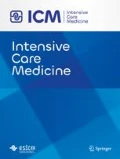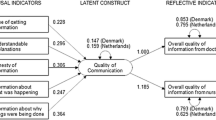Abstract
Background
Allowing family members to participate in the care of patients in intensive care units (ICUs) may improve the quality of their experience. No previous study has investigated opinions about family participation in ICUs.
Methods
Prospective multicenter survey in 78 ICUs (1,184 beds) in France involving 2,754 ICU caregivers and 544 family members of 357 consecutive patients. We determined opinions and experience about family participation in care; comprehension (of diagnosis, prognosis, and treatment) and satisfaction (Critical Care Family Needs Inventory) scores to assess the effectiveness of information to families and the Hospital Anxiety and Depression score for family members.
Results
Among caregivers 88.2% felt that participation in care should be offered to families. Only 33.4% of family members wanted to participate in care. Independent predictors of this desire fell into three groups: patient-related (SAPS II at ICU admission, OR 0.984); ICU stay length, OR 1.021), family-related (family member age, OR 0.97/year); family not of European descent, OR 0.294); previous ICU experience in the family, OR 1.59), and those related to emotional burden and effectiveness of information provided to family members (symptoms of depression in family members, OR 1.58); more time wanted for information, OR 1.06).
Conclusions
Most ICU caregivers are willing to invite family members to participate in patient care, but most family members would decline.
Similar content being viewed by others
References
Molter NC (1994) Families are not visitors in the critical care unit. Dimens Crit Care Nurs 13:2–3
Pochard F, Azoulay E, Chevret S, Lemaire F, Hubert P, Canoui P, Grassin M, Zittoun R, le Gall JR, Dhainaut JF, Schlemmer B (2001) Symptoms of anxiety and depression in family members of intensive care unit patients: ethical hypothesis regarding decision-making capacity. Crit Care Med 29:1893–1897
Azoulay E, Chevret S, Leleu G, Pochard F, Barboteu M, Adrie C, Canoui P, Le Gall JR, Schlemmer B (2000) Half the families of intensive care unit patients experience inadequate communication with physicians. Crit Care Med 28:3044–3049
Azoulay E, Pochard F, Chevret S, Lemaire F, Mokhtari M, Le Gall JR, Dhainaut JF, Schlemmer B (2001) Meeting the needs of intensive care unit patient families: a multicenter study. Am J Respir Crit Care Med 163:135–139
Johnson D, Wilson M, Cavanaugh B, Bryden C, Gudmundson D, Moodley O (1998) Measuring the ability to meet family needs in an intensive care unit. Crit Care Med 26:266–271
Wasser T, Pasquale MA, Matchett SC, Bryan Y, Pasquale M (2001) Establishing reliability and validity of the critical care family satisfaction survey. Crit Care Med 29:192–196
Heyland DK, Tranmer JE (2001) Measuring family satisfaction with care in the intensive care unit: the development of a questionnaire and preliminary results. J Crit Care 16:142–149
Ferrand E, Bachoud-Levi AC, Rodrigues M, Maggiore S, Brun-Buisson C, Lemaire F (2001) Decision-making capacity and surrogate designation in French ICU patients. Intensive Care Med 27:1360–1364
Cook D (2001) Patient autonomy versus parentalism. Crit Care Med 29:N24–N25
Burchardi H (2001) A surrogate for decision-making in the ICU. Intensive Care Med 27:1243–1244
Coppolino M, Ackerson L (2001) Do surrogate decision makers provide accurate consent for intensive care research? Chest 119:603–612
Hines SC, Glover JJ, Babrow AS, Holley JL, Badzek LA, Moss AH (2001) Improving advance care planning by accommodating family preferences. J Palliat Med 4:481–489
Prendergast TJ (2001) Advance care planning: pitfalls, progress, promise. Crit Care Med 29:N34–N39
Robinson SM, Mackenzie-Ross S, Campbell Hewson GL, Egleston CV, Prevost AT (1998) Psychological effect of witnessed resuscitation on bereaved relatives. Lancet 352:614–617
Robinson A, Thomson R (2001) Variability in patient preferences for participating in medical decision making: implication for the use of decision support tools. Qual Health Care 10:i34–i38
Laine C, Davidoff F (1996) Patient-centered medicine. A professional evolution. JAMA 275:152–156
Asch DA, Hansen-Flaschen J, Lanken PN (1995) Decisions to limit or continue life-sustaining treatment by critical care physicians in the United States: conflicts between physicians' practices and patients' wishes. Am J Respir Crit Care Med 151:288–292
Pochard F, Azoulay E, Chevret S, Vinsonneau C, Grassin M, Lemaire F, Herve C, Schlemmer B, Zittoun R, Dhainaut JF (2001) French intensivists do not apply American recommendations regarding decisions to forgo life-sustaining therapy. Crit Care Med 29:1887–1892
Vincent JL (1990) European attitudes towards ethical problems in intensive care medicine: results of an ethical questionnaire. Intensive Care Med 16:256–264
Hammond F (1995) Involving families in care within the intensive care environment: a descriptive survey. Intensive Crit Care Nurs 11:256–264
Le Gall JR, Lemeshow S, Saulnier F (1993) A new Simplified Acute Physiology Score (SAPS II) based on a European/North American multicenter study. JAMA 270:2957–2963
Meier DE, Morrison RS (2002) Autonomy reconsidered. N Engl J Med 346:1087–1089
Marsden C (1992) Family-centered critical care: an option or obligation? Am J Crit Care 1:115–117
Quill TE, Brody H (1996) Physician recommendations and patient autonomy: finding a balance between physician power and patient choice. Ann Intern Med 125:763–769
Fried TR, Bradley EH, Towle VR, Allore H (2002) Understanding the treatment preferences of seriously ill patients. N Engl J Med 346:1061–1066
Simon SK, Phillips K, Badalamenti S, Ohlert J, Krumberger J (1997) Current practices regarding visitation policies in critical care units. Am J Crit Care 6:210–217
Simpson T, Wilson D, Mucken N, Martin S, West E, Guinn N (1996) Implementation and evaluation of a liberalized visiting policy. Am J Crit Care 5:420–426
Henneman EA, McKenzie JB, Dewa CS (1992) An evaluation of interventions for meeting the information needs of families of critically ill patients. Am J Crit Care 1:85–93
Way J, Back AL, Curtis JR (2002) Withdrawing life support and resolution of conflict with families. BMJ 325:1342–1345
Curtis JR, Patrick DL, Shannon SE, Treece PD, Engelberg RA, Rubenfeld GD (2001) The family conference as a focus to improve communication about end-of-life care in the intensive care unit: opportunities for improvement. Crit Care Med 29:N26–N33
Truog RD, Cist AF, Brackett SE, Burns JP, Curley MA, Danis M, DeVita MA, Rosenbaum SH, Rothenberg DM, Sprung CL, Webb SA, Wlody GS, Hurford WE (2001) Recommendations for end-of-life care in the intensive care unit: the Ethics Committee of the Society of Critical Care Medicine. Crit Care Med 29:2332–2348
Vincent JL (1998) Information in the ICU: are we being honest with our patients? The results of a European questionnaire. Intensive Care Med 24:1251–1256
Acknowledgements
This study was carried out in the 78 ICUs listed in the Appendix. The coordinating study center was the Intensive Care Unit and Biostatistics Department of the Saint-Louis Teaching Hospital and University Paris 7, Assistance Publique des Hôpitaux de Paris, Paris, France. These findings were presented at the congress of the French Society of Critical Care Medicine, January 2003.
Author information
Authors and Affiliations
Consortia
Corresponding author
Additional information
Supported by a grant (AOR1004) from the Assistance Publique des Hôpitaux de Paris and the Direction Régionale de la Recherche Clinique. Affiliations of the authors are listed in the Appendix
Appendix: members of the Famirea Group
Appendix: members of the Famirea Group
The following individuals and ICUs participated in the study: Christophe Adrie, Saint-Denis; Djillali Annane, Garches; Charles Arich, Nimes; Marie-Lou Baillot, Garches; Jean Pierre Bedos, Versailles; Doris Berdugo, Tenon Hospital, Paris; Gérard Bleichner, Argenteuil; Bernard Blettery, Dijon; Pierre Edouard Bollaert, Nancy; Caroline Bornstain, Saint-Louis Hospital, Paris; Yves Bouffard, Lyon; Thierry Boulain, Orléans; François Brivet, Clamart; Frédéric Brun, Auxerre; Fabienne Burnel, Arras; Jean Carlet, Saint-Joseph Hospital, Paris; Pierre-Emmanuel Charles, Dijon; Christine Cheval, Saint-Joseph Hospital, Paris; Yves Cohen, Bobigny; Madeleine Coloigner, Quimper; Françoise Delerue, Lyon; Thibaut Desmettre, Bethune; Didier Dreyfuss, Colombes; Didier Dubois, Arras; Jacques Duranteau, Le Kremlin Bicêtre; Marc Feissel, Belfort; Fabienne Fieux, Saint-Louis Hospital, Paris; Jean-Philippe Fosse, Bobigny; Gerard Fournier, Lyon; Richard Galliot, Versailles; Maité Garrouste-Orgeas, Saint-Joseph Hospital, Paris; Christophe Guitton, Nantes; Jan Hayon, Saint-Germain; Patrick Herbecq, Roubaix; Esther Iglesias, François Blot, Villejuif; Luc Marie Joly, Saint-Anne Hospital, Paris; Mercé Jourdain, Lille; Michel Kaidomar, Frejus, Saint-Raphaël; Christian Laplace, Le Kremlin Bicêtre; Jerome Larche, Nancy; Christine Lebert, La Roche sur Yon; Alain Lepape, Lyon; Nicolas Letellier, Dreux; Olivier Levavasseur, Lyon; Erwan Lher, Brest; Olivier Marie, Saint-Louis Hospital, Paris; Peter Maurer, Nancy; Serge Moulront, Dunkerque; Bernard Page, Boulogne; Antoine Parrot, Tenon Hospital, Paris; Etienne Pigne, Colombes; Bernard Pinat, Dunkerque; Juliette Pingat, Cochin Hospital, Paris; Catherine Poisson, Lens; Patricia Renault, Alençon; Anne Renault, Brest; Sylvie Riviere, Evry; Pierre-Andre Rodie-Talbere, Lille; Isabelle Runge, Orléans; Olivier Sanchez, Georges Pompidou Hospital, Paris; Dominique Selcer, Christian Crombe, Arles; Alain Sermet, Saint-Anne Hospital, Paris; Alain Tenaillon, Evry; Catherine Thouzard-Taragon, Garches; Marie Thuong, Saint-Denis; Jean-François Timsit, Bichat Hospital, Paris; Dany Goldgran-Toledano, Lariboisière Hospital, Paris; Patrick Tulasne, Illkirch; Benot Vallet, Lille; Daniel Villers, Nantes; Christophe Vinsonneau, Cochin Hospital, Paris; Jean-Ralph Zahar, Créteil
Rights and permissions
About this article
Cite this article
Azoulay, É., Pochard, F., Chevret, S. et al. Family participation in care to the critically ill: opinions of families and staff. Intensive Care Med 29, 1498–1504 (2003). https://doi.org/10.1007/s00134-003-1904-y
Received:
Accepted:
Published:
Issue Date:
DOI: https://doi.org/10.1007/s00134-003-1904-y




